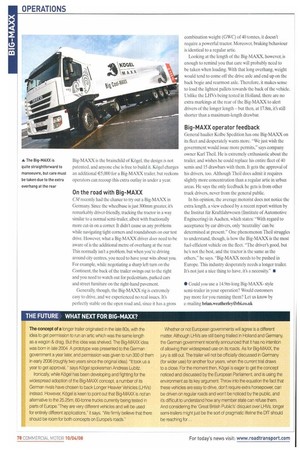THE FUTURE WHAT NEXT FOR BIG-MAXX?
Page 78

If you've noticed an error in this article please click here to report it so we can fix it.
The concept of a longer trailer originated in the late 80s, with the idea to get permission to run an artic which was the same length as a wagon & drag. But this idea was shelved. The Big-MA)0< idea was born in late 2004. A prototype was presented to the German government a year later, and permission was given to run 303 of them in early 2006 (roughly two years since the original idea). It took us a year to get approval, says Kogel spokesman Andreas Lubitz.
IronrcaIly, while KOgel has been developing and fighting for the widespread adoption of the Big-MAXX concept, a number of its German rivals have chosen to back Longer Heavier Vehicles (LHVs) instead. However, Kegel is keen to point out that Big-MAXX is not an alternative to the 25.25m, 60-tonne trucks currently being tested in parts of Europe."They are very different vehicles and will be used for entirely different applications," it says. 'We firmly believe that there should be room for both concepts on Europe's roads." Whether or not European governments will agree is a different matter. Although LHVs are still being tidied in Holland and Germany, the German government recently announced that it has no intention of allowing their widespread use on its roads. As for Big-MAXX, the jury is still out. The trailer will not be officially discussed in Germany (for wider use) for another four years, when the current trial draws to a close. For the moment then, Kogel is eager to get the concept noticed and discussed by the European Parliament, and is using the environment as its key argument. Throw into the equation the fact that these vehicles are easy to drive, don't require extra horsepower, can be driven on regular roads and won't be noticed by the public, and ifs difficult to understand how any member state can refuse them. And considering the 'Great British Public's' disquiet over LHVs, longer semi-trailers might just be the sort of pragmatic lifeline the OfT should be reaching for...












































































































































































































